Preparing grad and professional Schools for remote fall
Many groups spent the summer rethinking pedagogy and technology
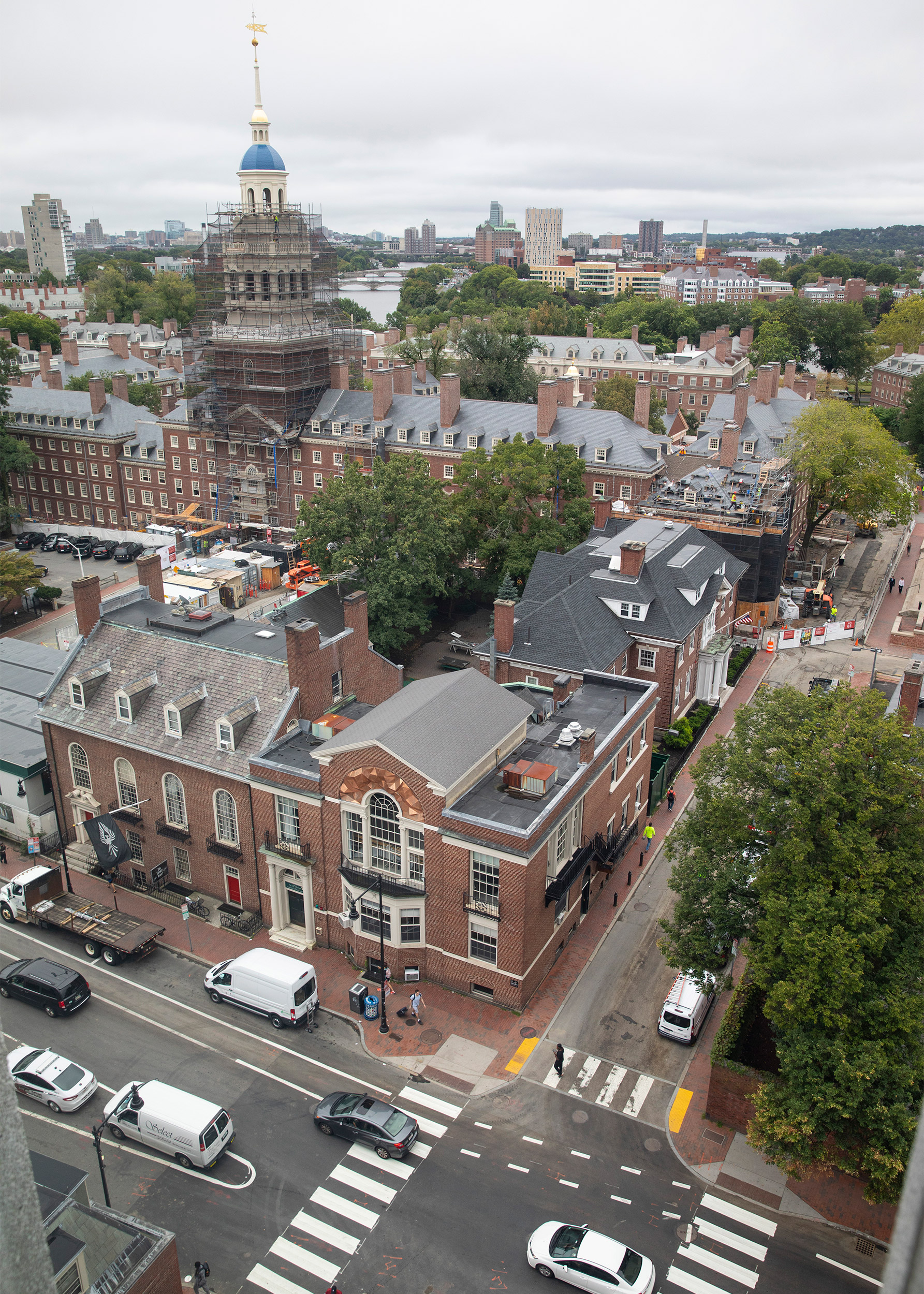
Kris Snibbe/Harvard file photo
Being in the business of education, it comes as no surprise that the Harvard Graduate School of Education (HGSE) would revamp its curriculum and hire eight recent Ed.M. graduates with skills and expertise in learning design, educational media production, and instructional coaching to help faculty prepare for a remote semester amid a time of cultural upheaval.
But it’s not the only one. Across the University, the graduate and professional Schools spent the summer taking a hard look at what they were doing and why, to ensure that students will not miss a beat in their education or experience. From the Divinity School to the Design School to the Kennedy School, the Law School to the Med School to the Business School, all of the faculty went through essentially the same exercise to devise tailored pedagogical and technological solutions.
It was the only path forward, said Nonie Lesaux, HGSE academic dean and Juliana W. and William Foss Thompson Professor of Education and Society.
“This is a moment in time that demands unprecedented innovation and inspiration,” said Lesaux. “As a faculty [at HGSE], we’ve designed a curriculum that reflects the best of what we know about how powerful learning experiences are nurtured online, and that places key educational topics, issues, and dilemmas salient to today’s circumstances and challenges at the core.”
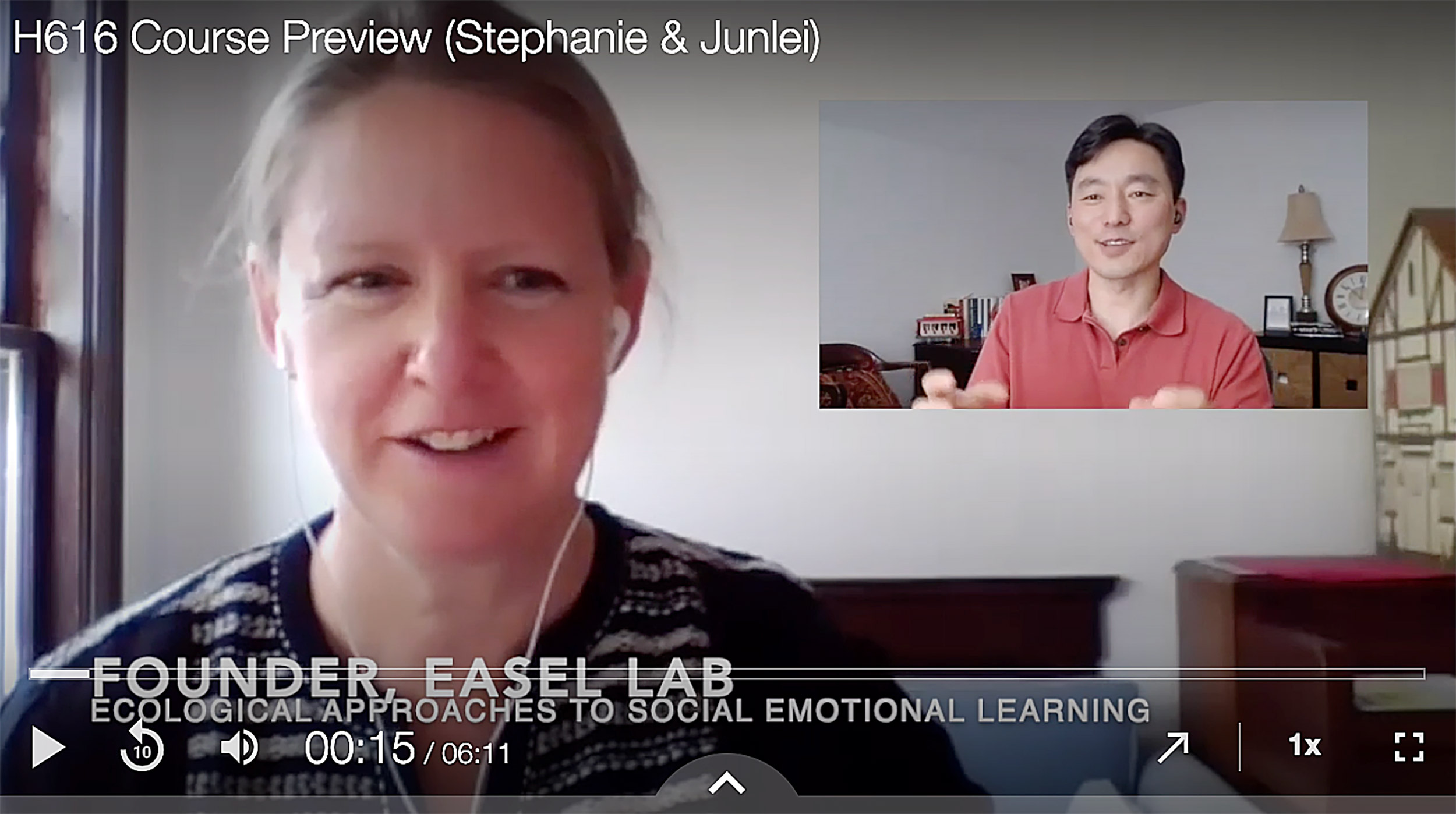
Building on its track record of high-quality online courses, the School developed 85 new classes about pressing challenges facing the profession, including COVID-19 and anti-Black racism. Among them are a course that deals with schooling during a pandemic; another explores race, education, and the roots of U.S. inequality; and another aims to understand educational inequality, and a range of real-world dilemmas for educators.
The classes are the result of an effort between faculty and the School’s Teaching and Learning Lab, said Matthew L. Miller, associate dean for learning and teaching. The lab has been offering coaching, consultation, and workshops to help faculty plan and design their courses and learn best practices in remote teaching.
“This is a moment in time that demands unprecedented innovation and inspiration.”
Nonie Lesaux, HGSE academic dean
To accommodate and connect the School’s global student body, which hails from 62 countries and 47 U.S. states, about 50 courses are being offered on repeated schedules. Also available are co-curricular experiences that incorporate innovative digital learning practices, including direct access to instructors and peers, engaging learning opportunities, and curricular flexibility. Students can be connected to field experiences far from where they are located — or to alumni in the same region. To help students make a smooth transition into the fall semester, the School launched the “Online Learning Success” mini course, with best practices for learning and thriving on Zoom and Canvas, and how to collaborate and form relationships.
For all the innovations in technology and pedagogy, the School will remain true to its goal of helping students develop skills as leaders and practitioners by grounding their studies in real-world problems and making them take part in field experiences and professional development, said Dean Bridget Terry Long.
“Fortunately, the most foundational and transformative aspects of HGSE are not changing,” said Long. “Capitalizing on what we know and have learned about how online communities thrive, we are designing approaches that will foster cohort and community in numerous ways, ensuring that you build and maintain a network of colleagues, friends, and support systems that will last beyond your time at HGSE.”

Harvard Divinity School
At Harvard Divinity School (HDS), students and faculty got an early start on planning for the academic year as it embarked on an online version of the Summer Language Program, an eight-week intensive program in Biblical Hebrew, classical Arabic, Christian Latin, and other languages.
The experience of running the program, which has been around since 1960, as a synchronous offering, gave the School a chance to explore what remote instruction could look like. Based on the feedback from teaching staff and students, HDS faculty and students feel optimistic.
“Despite being separated in flesh, our work brought us together in spirit.”
Malini Srikrishna, M.T.S. candidate
For Beatrice Chrystall, who taught a class on Pali, an ancient language used in the Theravada
Buddhist tradition, the biggest worry was the lack of personal connection among students, but that concern proved unnecessary. “My happiest moment was when, as I stepped away from the computer to get a book, I heard one student say to the others, ‘It’s nice how we’ve all bonded, isn’t it?’” Chrystall said.
Students felt the same way. “Despite being separated in flesh, our work brought us together in spirit,” said M.T.S. candidate Malini Srikrishna, who took theological Spanish. “It was especially during the breakout rooms that we spent time with each other and intimately engaging with texts.”
HDS also launched an online teaching and learning site, which offers training, tools, and resources for students and faculty. Besides hosting small-group live training for professors, adjuncts, and teaching fellows, the School is making available technology assistance for faculty in real time. The School also hired graduate students with competencies in Canvas, media and A/V services, and classroom technologies, and formed the Academic Technology Group, which aims to recreate online the in-person class experience and sense of community.
Expectations are high, but officials said the School plans to meet not only the technological challenges but also the ethical questions that have emerged during the twin pandemics of coronavirus and racism.
“HDS faculty are committed to teaching topics and adapting new pedagogies in order to be more attentive than ever to our current global crises,” said Janet Gyatso, HDS associate dean for faculty and academic affairs and Hershey Professor of Buddhist Studies. “Courses will endeavor to keep in their purview the real-life implications and ethics of their materials and contents. In addition, much attention at HDS more generally will be paid to the problem of racism, among other forms of oppression, this year, and [the School is] committed to its theme of ‘Building an Anti-racist and Anti-oppressive Harvard Divinity School.’”
Harvard Graduate School of Design
At the Graduate School of Design, the physical nature of studying architecture and design — visiting sites, milling models, critiquing physical work — has inspired a reorientation of not only instruction, but the process of design more generally.
Students rely on site trips to gain objective and subjective feedback, often involving communicating with local communities and expert stakeholders, followed by weeks of research back in Cambridge.
GSD faculty have inverted that process for the fall term. Students will begin with research, then use video tours to complete their understanding of the site being studied. Similarly, rather than meet with a small number of stakeholders during a visit, students will engage with local experts throughout the term for help with research and feedback. In Rahul Mehrotra’s course “Extreme Urbanism,” focused on a stretch of rural Afghanistan, students will partner with NGOs and stakeholders on the ground, Kabul University students, and other local organizations.
GSD faculty have also considered how to help students get away from screens and fuel hands-on creativity. The School’s Fabrication Lab has designed, created, and shipped tool kits for a series of core-curriculum courses so students can begin designing immediately. For example, 37 students enrolled in the landscape architecture studio received kits that included laser-cut parts for models, large-scale plots and prints for mapping, and an elm leaf plucked from Harvard Yard for inspiration.
Another landscape architecture studio sent students kits to model its first site of study, Boston’s City Hall Plaza. And to show that creativity has no boundaries, Martin Bechthold, who leads the School’s Design Engineering program, is having his “Structural Design II” students use dry spaghetti for projects.

For Bechthold, who is also associate faculty at the Wyss Institute, using dry pasta as model-building material has many benefits: It is cheap, can be purchased anywhere, and due to its breakable nature is a “very suitable material platform” to help students learn from failures.
“Most important from the learning aspect, uncooked spaghetti is relatively brittle, not too strong, and very slender, meaning they tend to buckle when you push the ends together,” said Bechthold. “Using a relatively ‘bad’ material to understand structural behavior is ideal for learning, because deformations and even structural failures can be readily and cheaply experienced in the real physical world, so the model really become a microcosm of the issues we are teaching in the class.”
GSD students and faculty also hope to leverage the global possibilities of Zoom and other video-conferencing platforms. Final reviews of student work occur at semester’s end and traditionally involve a handful of critics and students. But they have now morphed into public presentations that can attract up to 400 interested students, professors, friends, and colleagues, a reach not feasible in the physical review setting, and one that inspired idea sharing and collaboration with counterparts around the world during spring 2020.
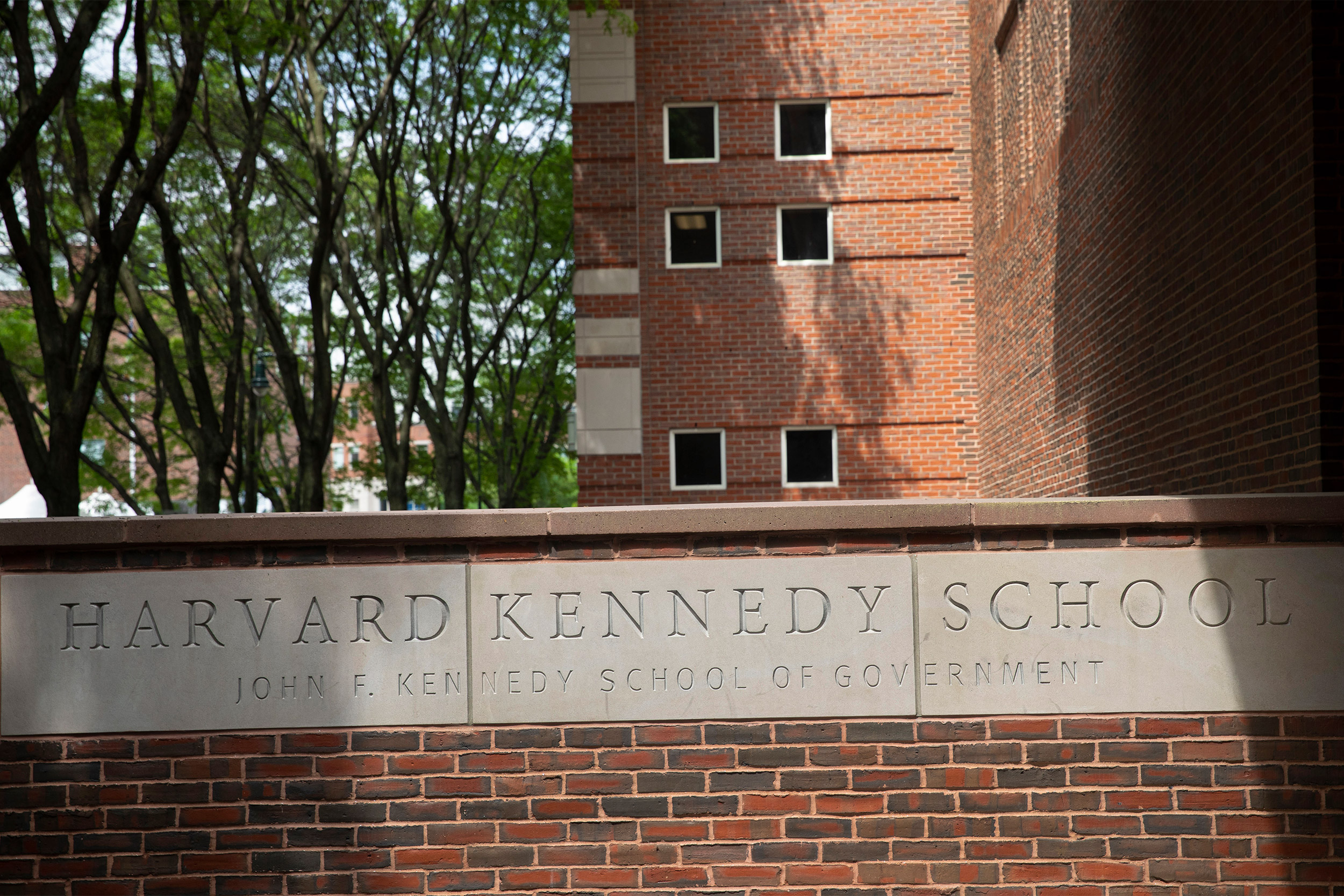
Harvard Kennedy School of Government
Harvard Kennedy School faculty and staff with expertise in online teaching and learning design worked together to develop approaches to build community online, including greater faculty-student engagement in small groups and more peer-to-peer engagement, said Dean Douglas Elmendorf.
“We are working not just to replace what might have happened in person, but to create new opportunities for you to engage with our faculty and with each other,” said Elmendorf, Don K. Price Professor of Public Policy, in a letter to incoming and returning students that detailed the changes. “Although we cannot be together in person, we are confident we can be together —learning and building community — online.”
A large part of the effort to recreate the teaching and learning experience took place in the Online Course Transformation Workshop. Launched in early July, the workshop was led by faculty innovators in online teaching such as Teddy Svoronos, the faculty lead of the online course transformation effort at HKS, Pinar Dogan, who led a session on syllabus redesign, and Dan Levy, who contributed advice from his recent eBook on teaching with Zoom.
The response has been massive, said Mae Klinger, assistant director for digital learning design at HKS. “The content, skills, and knowledge at the core of the Kennedy School’s degree programs have never been more necessary,” she said. “To answer this call, HKS faculty, students, and staff will be challenged to teach, learn, and interact in new ways.”
More than 400 faculty, faculty assistants, and teaching assistants enrolled in the workshop, where they learned how to redesign course syllabi; build community online; translate HKS signature pedagogy, such as cases and simulations, for a remote setting; create asynchronous learning materials; do online assessment; and teach live sessions.
The workshop was developed by Svoronos, Klinger, Kate Hamilton of Strengthening Learning and Teaching Excellence (SLATE), and Ian Tosh of the Ed Tech staff. For Svoronos, the biggest difficulty this semester will be creating a sense of community and belonging in classrooms.
“The kinds of informal hallway conversations that happen on campus will be difficult to replicate,” said Svoronos, a lecturer in public policy. “That said, I’m excited by all the different tools I can use to get to know my students (e.g., Teachly, Slack), and ways in which students can bring experiences from wherever they are into our discussions.”
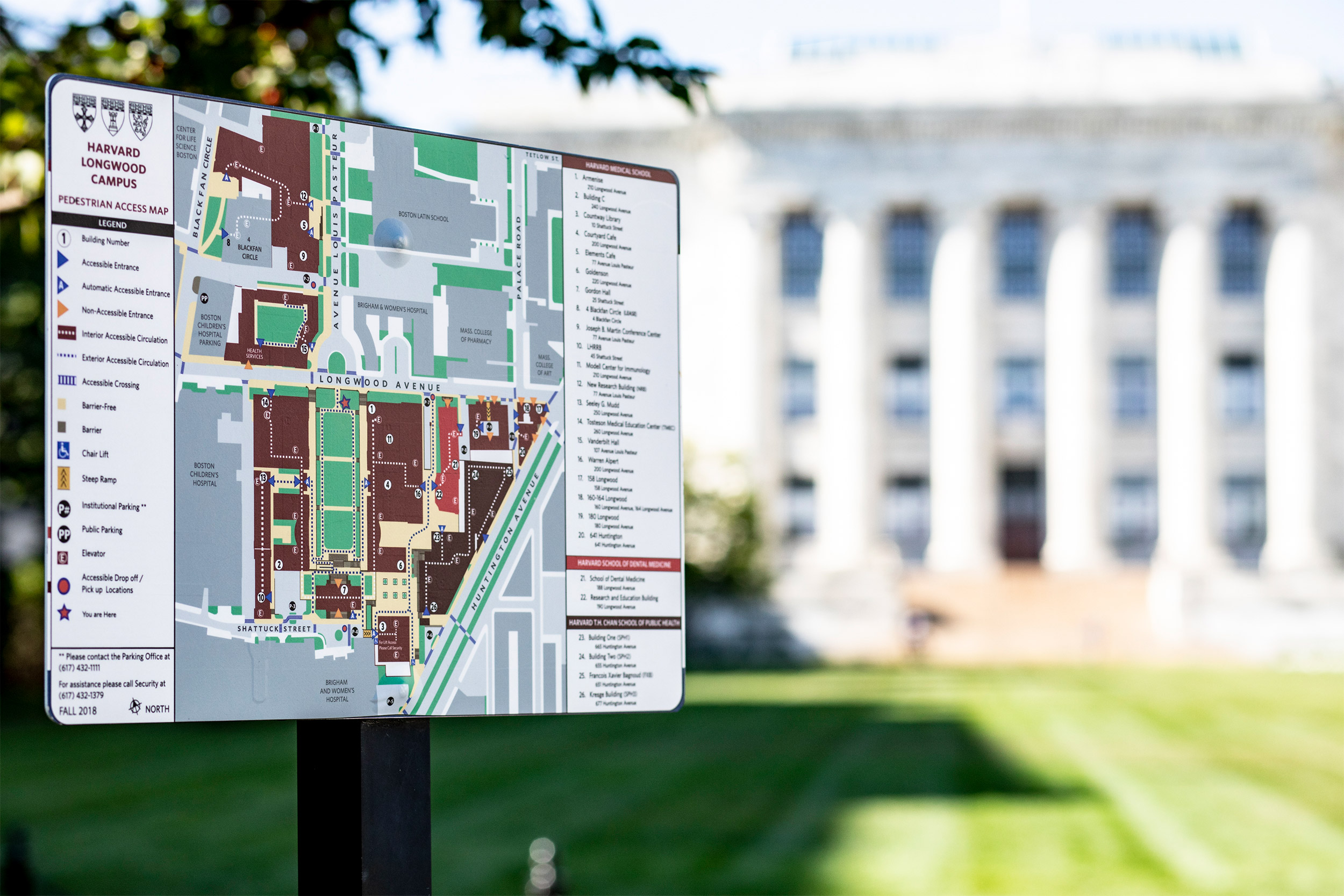
Harvard Medical School
At Harvard Medical School (HMS), where hands-on learning and clinical experiences are a core part of the curriculum, first-year students became the only class in the School’s 232-year history to begin their studies remotely. Most second- through fifth-years resumed their work in person to pursue hands-on clinical rotations and laboratory research studies.
It was a different start of the School year for the entering class, who took part in a virtual White Coat Ceremony marking their transition into the medical profession in early August. Over the summer, students were able to build strong bonds with each other, said Ed Hundert, Dean for Medical Education.
“I have been in awe of how the faculty, staff, and students rallied around the challenge of a virtual launch to the academic year,” said Hundert. “With the faculty advisers and core teaching faculty doing Zooms with the students over the summer, it’s ironic that everyone already knew one another better this year before they started than ever before!”
The transition to online classes in spring was a relatively easy one for the School, due to its five years of experience with “flipped classrooms,” an online format that allows faculty to prepare videos and material prior to their in-person classes. The shift spurred faculty to convert their courses into a virtual format, and with the widespread use of telemedicine during the pandemic, professors are incorporating remote learning into their teaching in the fall.
Teaching medical students how to practice telemedicine is one of the most exciting, innovative, and successful components of the COVID-19 crisis, said John Dalrymple, associate dean for medical education quality improvement.
HMS faculty remains committed to creating community and personal connection both among first-year students and between students and faculty, said Barbara Cockrill, Harold Amos Associate Professor, HMS director of faculty development, M.D. program.
“Medicine is a ‘team sport,’ and we have based much of our pedagogical approach on peer teaching, learning, and discussions — all supported by close connections between students and faculty,” said Cockrill in an email.
“In adapting our courses to Zoom, we have tried to be very intentional about effectively using small group discussions (‘breakout rooms’) for student interactions and creating frameworks to make sure that students and faculty can connect directly (albeit virtually!). As faculty, we still want to get to know our students on a personal level, and want students to get to know each other as well.”

Harvard School of Dental Medicine
The Harvard School of Dental Medicine (HSDM) brought third- and fourth-years, as well as advanced graduate students, back to campus in early July. While they still take some courses online, they are divided into small groups on campus to observe social distancing within the preclinical lab space. Advanced graduate students have also returned to work in the clinic, which has enhanced safety protocols.
For Ashiana Jivraj, M.B.A. ’19, Class of 2021 D.M.D. candidate, the mixed approach has been challenging but successful.
“The School was able to bridge the gap nicely and allowed us to still learn — especially in a field where in-person learning is crucial,” said Jivraj. “Being able to come back to campus and continue our training has been crucial, especially for our patients who were in a holding pattern, and where dental health is often put on the back burner.”
First-years began their online program with HMS classmates in early August. For second-years, who are also studying remotely, faculty came up with a creative way to help them prepare for their preclinical experience while home. Students will receive wax carving blocks and instruments to perform exercises in which they replicate incisor, canine, premolar, and molar teeth.
Faculty will record videos for students to use as review materials for the exercises. Students will be asked to upload pictures from several angles for faculty to give feedback in a live Zoom session.
William V. Giannobile, D.M.Sc. ’96, who became dean of HSDM on Sept. 1, said he will continue to focus on the safety of students, faculty, and staff delivering care in the clinics, and work to provide a first-rate virtual learning environment for those at home.
“My biggest priority is working with School leadership to continue to support our clinical and educational efforts so that we can optimize our ability to further research, teaching, and clinical care in the face of the pandemic,” said Giannobile.
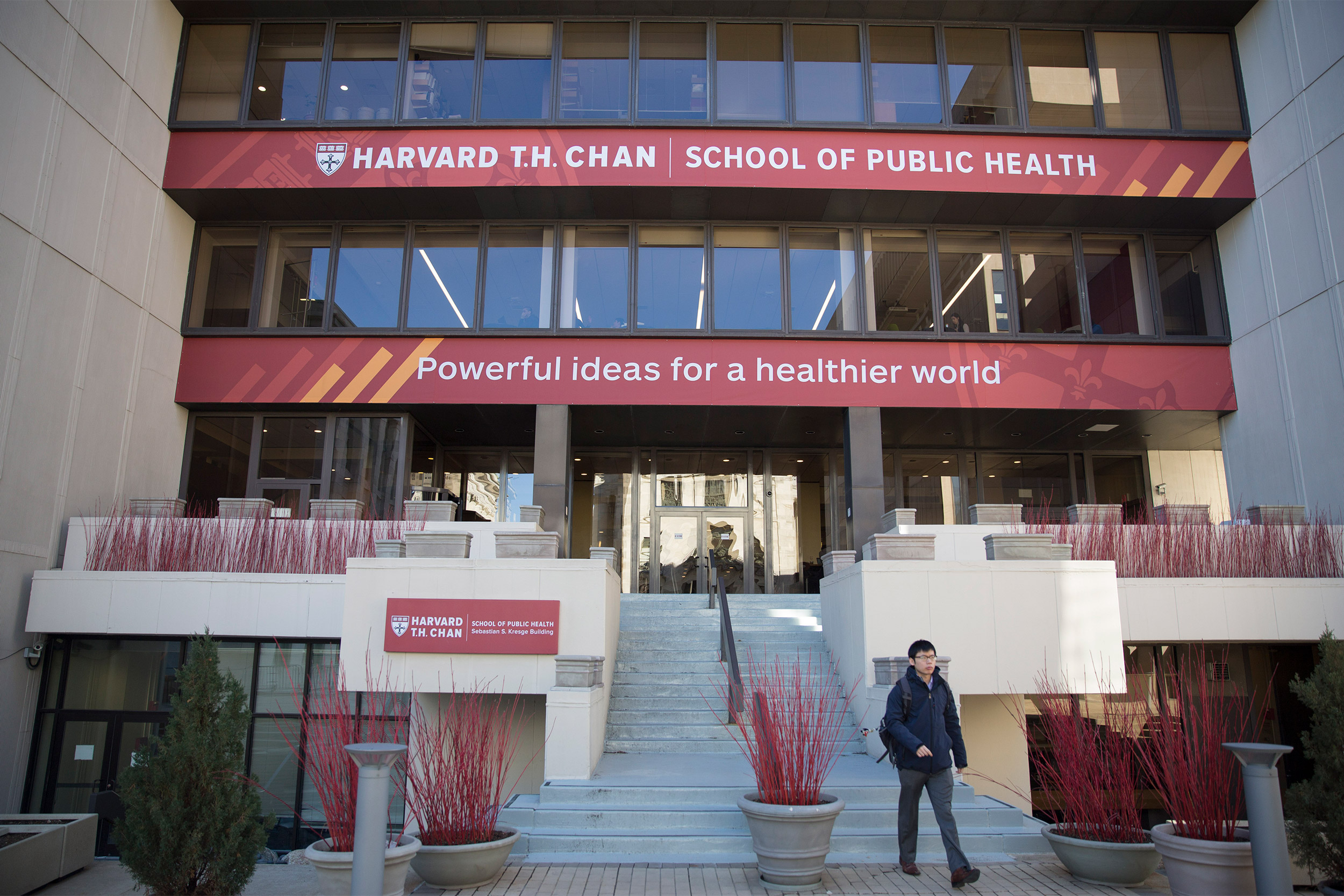
Harvard T.H. Chan School of Public Health
During the spring, Harvard T.H. Chan School of Public Health experts played a leading role in helping the public understand the coronavirus outbreak as it was unfolding and spreading internationally. A week into the fall semester, Chan School researchers are still busy working on the front lines of the global response, while as educators they have incorporated the twin public health crises of COVID-19 and racism into their teaching.
It’s an important moment for public health education, said Sue J. Goldie, Roger Irving Lee Professor of Public Health, in her welcome video to 500 students who took her summer online course “Foundations for Public Health,” which goes until November.
“This is such an important moment, and it’s a moment that has huge challenges both for you as students and for the faculty at School,” said Goldie, who is also director of the Global Health Education and Learning Incubator at Harvard. “But it’s also far more important a moment for society and a critical moment for public health. You are the future leaders of public health, and we need you.”
The School has developed the CHANnel program to help current and incoming students make connections with each other and throughout their global community.
“This year, few things have been more important than maintaining the connections between friends, family, and colleagues,” said Robin Glover, associate dean for student services, and Erin Driver-Linn, dean for education, in a letter to staff. “The CHANnels will be vibrant virtual spaces to facilitate community-building, networking, and opportunities for informal learning.”
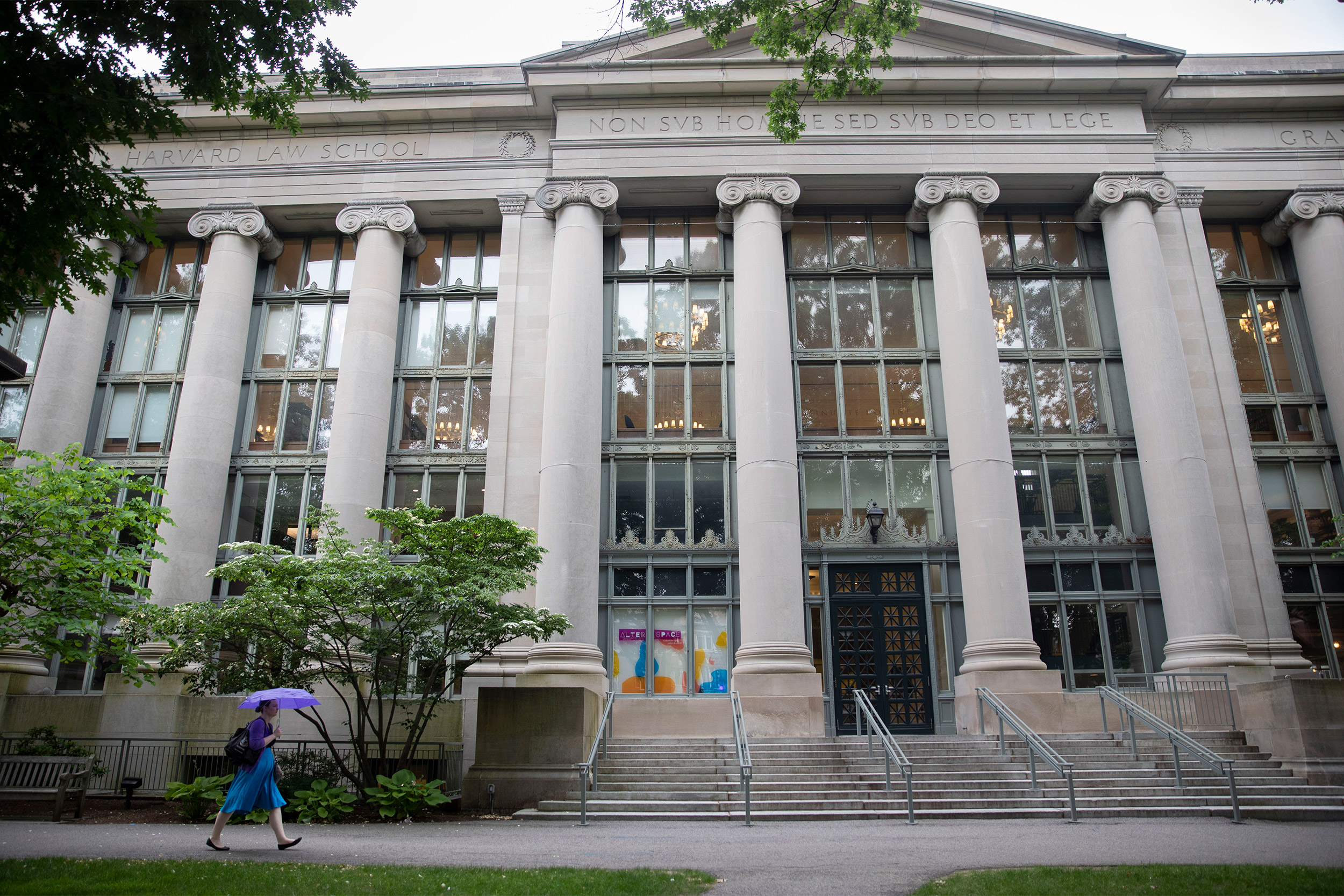
Harvard Law School
Faculty and administrators at Harvard Law School (HLS) spent the summer consulting with experts in remote learning. But the work actually began in the spring, after the coronavirus pandemic forced the School to move all 260 of its courses and clinical offerings online. In mid-April, Dean John F. Manning ’85 created the Online Teaching Working Group to identify best practices.
“HLS has long been a leader in legal education, in the forefront in developing active, inductive Socratic learning and in pioneering clinical education,” said Manning. “During this pivotal moment, we intend to preserve the best of legal pedagogy as it has developed over many years and to see what new things we might learn about how to deliver excellent legal education.”
To lead that effort, the School hired Leah A. Plunkett ’06, who was the lead architect of one of the nation’s first accredited hybrid-online J.D. programs, at the University of New Hampshire Law School. This summer, Plunkett joined HLS as the Meyer Research Lecturer on Law and special director for online education. She leads the School’s Learning Experience & Technology (LXT), whose technologists and experts in instructional design help faculty think about how to adapt effective in-class pedagogy to the online format.
For Ruth Okediji, Jeremiah Smith Jr. Professor of Law, the effort to explore new pedagogical tools is part of the School’s tradition.
“This is an institution known for innovation in legal education,” said Okediji. “And what an amazing set of experiences we anticipate as students feast on what the faculty has been focused on doing for the past five months, including how some of the technical challenges they likely will encounter in the classroom mimic those that lawyers currently face in practice.”
Within the clinical program at HLS, the new digital reality has expanded the horizon of opportunities. Students may now work at nonprofit and government offices across the country. For example, the Harvard Legal Aid Bureau, one of the School’s many clinical programs, has continued its advocacy work with other Boston groups in support of a statewide moratorium on evictions, which was implemented in April and extended from August to October. The Prison Legal Assistance Program is working with clients in prisons, where COVID-19 is rampant, while the Legal Services Center and Criminal Justice Institute, among others, are also assisting clients affected by the virus.

Radcliffe Institute for Advanced Study
At the Radcliffe Institute for Advanced Study, which every year brings a class of outstanding scholars, scientists, artists, and practitioners from all over the world to campus for its recognized one-year fellowship program, everything will be virtual.
In a press release announcing the 2020‒2021 class, Radcliffe Dean Tomiko Brown-Nagin RI ’17 said the fellowship will maintain its focus on both the exchange across disciplines and deep exploration.
“Our fellows will advance human understanding in the sciences, social sciences, and humanities,” said Brown-Nagin, who is also the Daniel P.S. Paul Professor of Constitutional Law at HLS and a professor of history in the Faculty of Arts and Sciences.
“Their creative work will change how we see the world. And they will pursue solutions to some of the most pressing issues facing our society,” she said. “Their endeavors will be immeasurably enhanced by the unique intellectual cross-fertilization that takes place at Radcliffe.”
As in the past, members of this year’s Radcliffe class come to Harvard with a specific project in mind. Among them are an experimental filmmaker who will produce a film on the 1921 Tulsa Race Massacre, an academic who is investigating the origins of Latinx identity in Spanish-language newspapers published in the U.S. during the first half of the 20th century, a professor of health policy working to expand on his efforts to curb gun violence, and an artist who will create a comic book about the U.S. health care system.
The fellowship will include elements familiar to Radcliffe and the fellows, such as the private and public talks, respectively, on Tuesdays and Wednesdays, via Zoom.
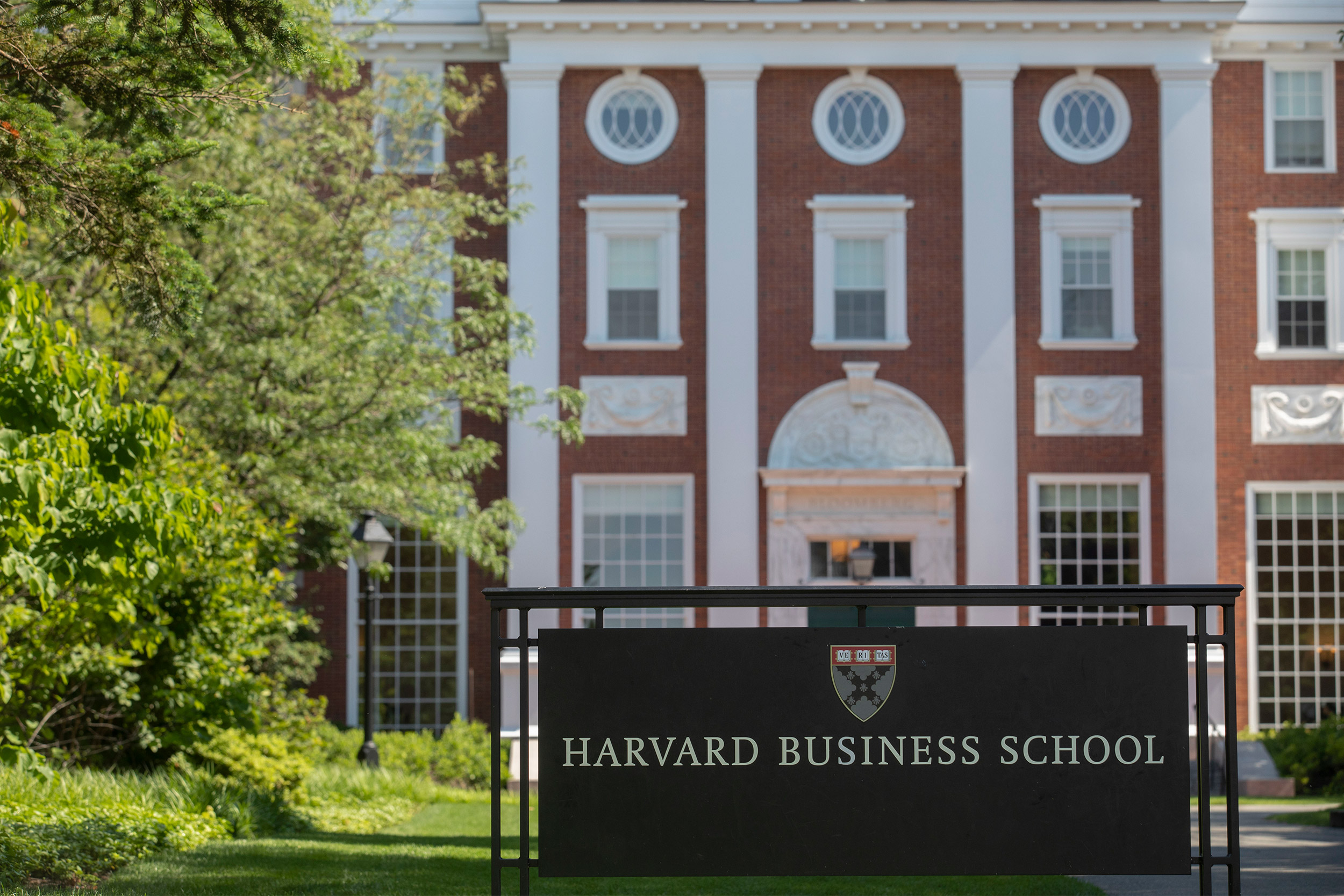
Harvard Business School
Harvard Business School, known for its M.B.A. program’s residential character, sought to combine an enhanced remote learning experience with some in-person opportunity for students.
A team of faculty and staff took part in the development process, which included rigorous experimentation in May and June, and eventually landed on a synchronous hybrid system for the fall. With 16 hybrid classrooms prepared, about 1,500 students returned to School. Most are living on campus, and many are logging into classes remotely. Executive education programs are exclusively online for the fall.
In a letter to the HBS community, Dean Nitin Nohria and Executive Dean for Administration Angela Q. Crispi welcomed students back to campus on Sept. 1, reminding them that when they graduate, they will be “uniquely poised to make a difference in the world.”
The School has created a list of technology requirements for students and faculty to ensure they have the right tools for the system. Intensive training, focused on teaching the HBS case method, was held for faculty and classroom support staff. More than 165 training sessions were offered to nearly 700 people. Similar sessions were held for incoming students to review key technology details with support staff.
A new website was developed to share information, updates, and support documentation, including nine digital guides and eight new quick-reference guides. Another site reminds students how to keep themselves and HBS healthy.
“We need everyone’s partnership to succeed, and we’re counting on everyone to play their part … by wearing masks, by avoiding risky gatherings, by maintaining physical distancing.”
Nitin Nohria, HBS dean
The School also has established dedicated Slack channels for just-in-time remote and hybrid classroom issues. This was a successful model developed in thespring when HBS moved online.
Another spring development was the use of what the School calls Online Learning Facilitators. The staff volunteers from across HBS are paired with faculty to help them manage class technology needs and serve as a point of contact with IT so the faculty can focus on teaching.
As the semester gets underway, Nohria’s message to the community is a good reminder that success will require full participation by all.
“As much progress as we’ve made and as robust as our processes might be, we must yet emphasize the fragility of our endeavor,” he said. “We need everyone’s partnership to succeed, and we’re counting on everyone to play their part … by wearing masks, by avoiding risky gatherings, by maintaining physical distancing. We know we sound like parents at times (we are!). But we are driven by our love for this institution and everyone who comprises it, and we are eager for each of you — students, staff, and faculty — to have an experience at the School that lives up to your expectations of it.”




